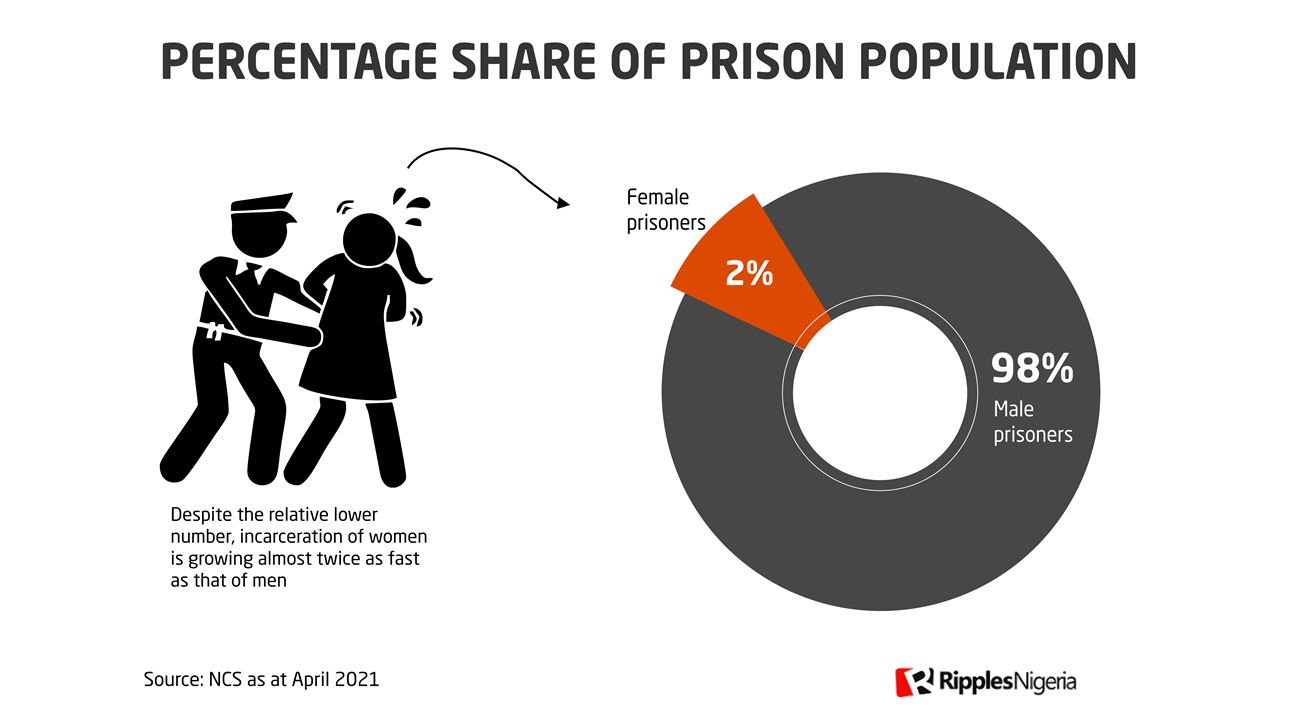Ripples Metrics
RipplesMetrics: Data show Nigerian women are going to prison faster than men

The increase of women in Nigerian prisons has far surpassed the growth of male prisoners in the last 20 years.
This is according to data from the Nigerian Correctional service (NCS) and World Prison Brief analysed by Ripples Nigeria.
The data from NCS showed that as at 19th April, 2021, there were 65,424 inmates across the country, out of which 64,214 were male and 1,210 female prisoners.
Among the 1,210 women incarcerated, 298 have been convicted while 912 are still awaiting trial.
Male prisons on the hand currently house 17,656 convicted prisoners and 46,558 awaiting trial.
From the above figures, clearly, men still make up the majority of prisoners in Nigeria, far exceeding that of the female prisoners.
However, a trend analysis revealed the growth rate for women has been dramatically higher than the growth rate for men over the past few decades.
In World Prison Brief data, referencing the official website of Nigeria prison service, as at year 2000, the number of female inmates were only 709 females.
When the figure is compared to the 1,210 female prison population in 2021, it shows a growth of 70.6 percent in the last 20 years.
Comparatively, male prison population increased from 43,728 in 2000, to 64,214 as of April 19, 2021. However, the change represents a growth of 46.8 percent lower than the female.
The rise
Between 2000-2021, the rate of growth for female imprisonment has been twice as fast as men.
For instance, in 2000 the number of female prisoners were 706, which grew by 1.18 percent to 722 in five years. While the number of male during that same period fell by 10 percent.
Read also: RipplesMetrics: How oil companies, host communities fight cost Nigeria N74.6bn oil revenue
Five years later, female prison inmates increased by 24.2 percent to 897 in 2010. During that same period male prison inmates only grew by just over 3 percent.
Also in 2014, more spaces were created to accommodate 1,156 female prisoners, indicating a 28.8 percent increase from 2010.
In 2020, the World Prison brief report shows the number of female prisoners jumped again 22.4 percent to 1,415.
How ready are female prisons to accommodate more?
With the continued increase comes extra burden for Nigeria prison service, especially as pronounced in state facilities
Nigeria only has two all-female correctional facilities.
Kirikiri Prison, one of the two facilities in the country, has a capacity to accommodate 1,700 inmates, while Numan Old Prison in Adamawa, established in 2017, can keep an additional 400. Together, these two female prisons can accommodate 2,100 inmates.
Going by the growth rate in the number of females incarcerated, the Nigeria government might need to build new facilities soon or deal with similar congestion experienced at the male prisons in a few years time.
Nigeria vs rest of Africa
In Africa, the WPB ranks Nigeria fourth in prison population, but in terms of female prisoners to percentage of prison population, Nigeria sits at 47th position.
South Africa’s 147,922 total prison population is the highest in Africa, but South Sudan has the highest female prisoners to percentage of prison population of 10.9 percent.
Other countries with high female prison populations include the Central African Republic (8.2 %), Rwanda (7.4%) and Kenya (6.7%).
What next?
Women, no doubt, remain in the minority in the numbers of prisoners in the country, but the rapid growth should come as a concern.
Not only are more and more women getting unemployed, there is still a struggle to educate and keep girls in schools.
The latest unemployed figures, as of the fourth quarter of 2020, shows over 10 million of the female labour population have no jobs. This is at least 35.2 percent of the total female labour populations, higher than the 31.8 percent for male unemployment.
In fact, Women unemployment rate is also higher than the national rate of 33.3 percent.
What this means is that, yearly, female population is becoming more exposed to being recruited by criminals and government must look into empowerment to stop the trend.
By David Ibemere…
Join the conversation
Support Ripples Nigeria, hold up solutions journalism
Balanced, fearless journalism driven by data comes at huge financial costs.
As a media platform, we hold leadership accountable and will not trade the right to press freedom and free speech for a piece of cake.
If you like what we do, and are ready to uphold solutions journalism, kindly donate to the Ripples Nigeria cause.
Your support would help to ensure that citizens and institutions continue to have free access to credible and reliable information for societal development.




























